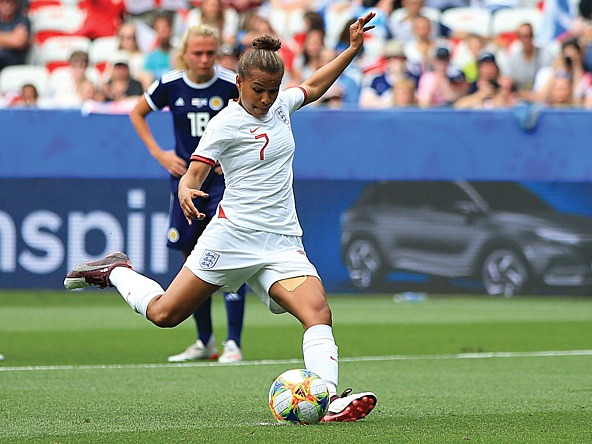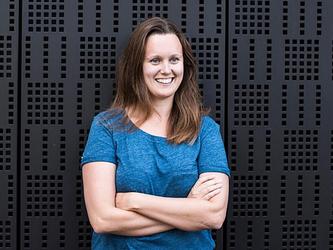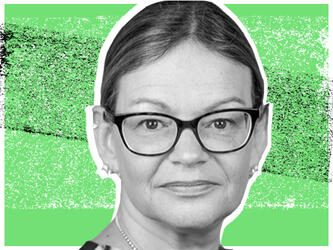Changing the game

Throughout June and the beginning of July, France hosted the eighth Fifa Women’s World Cup, and momentum for women’s football reached fever pitch. England’s Lionesses pulled in the viewers; new role models, more media exposure, record attendances and bigger investment has contributed to a sense that the women’s game is a force to be reckoned with.
“From the athletes to the federations, to broadcasters and brands – this is the biggest modern-day moment in women’s football. It’s a tipping point for the future of the game,” says Rebecca Smith, global executive director of the women’s game at media network Copa90.
While women’s football has undergone a seismic shift, access to the sport is still unequal for women and girls in terms of facilities, investment, visibility and opportunities to play, although this is changing. For the Football Association’s (FA’s) head of insight, Ross Antrobus, growth is driven by three things – grassroots participation, exposure at the elite end of the sport, and commercial backing.
The FA has invested heavily in increasing participation in the sport, and the organisation is well on its way to achieving its target of doubling the number of women and girls playing football by 2020. Boosting the number of girls playing will expand the talent pool in future and improve cultural acceptance of the sport – but engaging parents is key, as Antrobus explains.
“If a dad has a son, he’s far more likely to get involved in his son’s football than if he has a daughter who plays football. That attitude is starting to turn – there is a groundswell of ‘dadvocates’ – but I wouldn’t say we’re over that,” he says.
In football, there isn’t the same network of support and familiarity stemming from generations of participation – as there is in, say, netball – from mums who have played the game themselves. This is a bigger issue than the perception of football as a ‘boys’ sport’, according to Antrobus.
“When we were exploring different territories for how to position women’s and girls’ football, the idea that ‘it’s not just for boys’ was rejected outright by all the girls and their mums. The mums said: ‘I just don’t talk to my daughter in that sort of language. I don’t want her to go into football thinking she’s a pioneer; I want her thinking that she is an equal.’”
More visibility
The FA also wants to increase the potential fan base for women’s football, and is not just targeting women and girls. Appetite for the women’s game is rising, as shown by the Cup final match between Manchester City and West Ham, which drew an audience of more than 43,000 at Wembley.
Additionally, a study of young fans – male and female – in the UK, the US, China and Brazil found that more than half want to watch and learn more about women’s football. Despite this, visibility still needs to improve, according to the ‘Modern Football Fan’ research from Copa90. Almost half ( 44%) of respondents said the women’s game doesn’t feature on their radars often enough, and 26% were unaware of where to access game coverage.
Unlike men’s football, which is saturated with sponsors, the women’s game remains a comparatively untapped opportunity for commercial partnerships, but that is beginning to shift. Boots recently signed a three-year partnership with the FA to sponsor the England team and the other home nations, while Barclays has become the first title sponsor for the Women’s Super League, in a deal worth £10m.
Speaking at the Bloomberg Equality Summit in London, Lenah Ueltzen-Gabell, managing director for Europe and the Middle East at sports marketing agency Wasserman, said: “What we are seeing now is a real investment by brands understanding women’s sport – understanding how to engage with it, the value of it.”
The ugly spectre of sexism is still a big problem – according to research commissioned by the Telegraph, almost a third of British elite sportswomen have suffered sexual harassment and half have been victims of bullying.
In football, the issue was exemplified in a very public way when Ballon d’Or winner Ada Hegerberg was asked to twerk on stage, while Women in Football – the organisation supporting women who work in the industry – received more reports of online sexist abuse within the first two months of the 2018/19 season than in the previous 12 months. “Media has a leading role to play in this space, but it should be the responsibility of clubs, federations, and governing bodies to tackle sexism, and all forms of discrimination for that matter, just as it is everyone’s responsibility within the game and beyond,” says Smith.
She feels that fans can also play an important role in driving societal change from within football, “to create a sports landscape that is diverse, inclusive and accepting – and one that makes a positive impact”.

We hope you enjoyed this article.
Research Live is published by MRS.
The Market Research Society (MRS) exists to promote and protect the research sector, showcasing how research delivers impact for businesses and government.
Members of MRS enjoy many benefits including tailoured policy guidance, discounts on training and conferences, and access to member-only content.
For example, there's an archive of winning case studies from over a decade of MRS Awards.
Find out more about the benefits of joining MRS here.














0 Comments